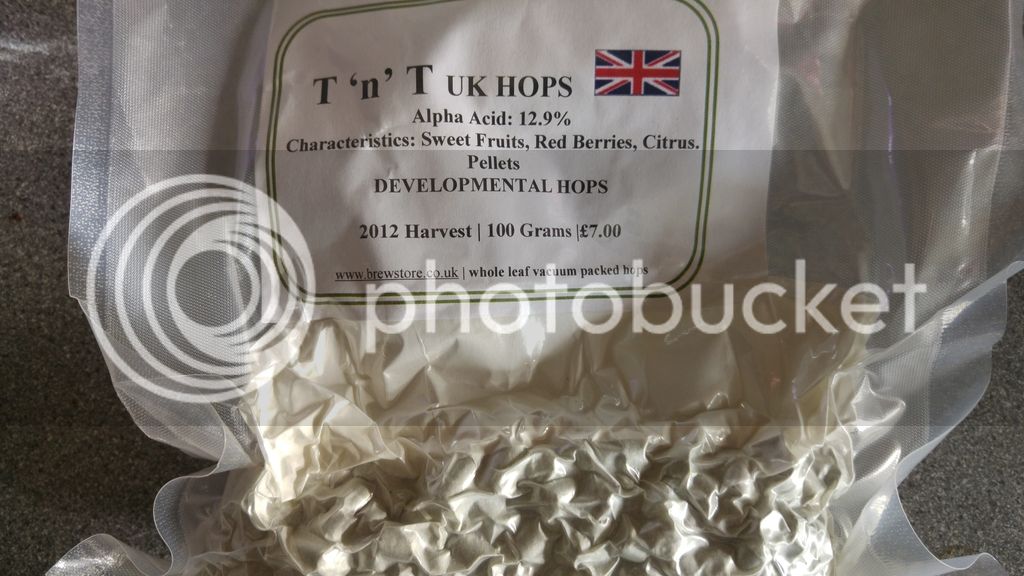This week's dilemma:
After making a few stronger beers of late I am planning on 2 of the next 3 being a bit weaker & loosely based on a Hophead recipe - pale malt, with a handful of caramalt, not very bitter, but with loads of late/dry hops.
For one of these brews I wanted to use some TnT hop pellets I impulse bought when shopping online with a supplier I hadn't used before.
I'd never seen this hop blend before, but I thought it might work well in a brew like this:-
Characterisitics: Explosive red berries, passionfruit and citrus.
Alpha acid 12.9%
Intensity: 7 (out of 10)
Intense sweet fruit aromas and flavours this hop blend can give more caramel and green fruit flavours if used in a cold infusion (dry hopping in the fermenter).
They didn't state the harvest year of any of their hops on the website and I was disappointed to find they were 2012 harvest when they arrived - especially considering the price I paid for them.
Due to the high alpha content my brewing software tells me I only need about 4g for bittering (assuming the alpha content is as stated on the pack), and obviously a little more or less makes a big impact on the IBU.
So I've been trying to find out some info about how to allow for the age of hops in a recipe. I couldn't find much in the forum archives, alougth I'm sure this must have been discussed before. But I did find this interesting calculator:
http://brewerslog.appspot.com/HopAlphaCalc
Although it varies from hops to hop & the TnT blend isn't on the list, this calculator is telling me that even if I store a 12% alpha hop at 0 deg C, in sealed vac packed barrier packaging, for 3 years, it will only have about 2-4% alpha remaining. Now I doubt that HB suppliers store hops in a freezer or even a fridge once the hops are vac packed. Which would mean that there is probably no alpha left to speak of - if the calculator is to be believed.
Sorry for the long winded approach, but the question is:
Do anyone adjust recipes for the age of the hops? And if so how?
:
After making a few stronger beers of late I am planning on 2 of the next 3 being a bit weaker & loosely based on a Hophead recipe - pale malt, with a handful of caramalt, not very bitter, but with loads of late/dry hops.
For one of these brews I wanted to use some TnT hop pellets I impulse bought when shopping online with a supplier I hadn't used before.
I'd never seen this hop blend before, but I thought it might work well in a brew like this:-
Characterisitics: Explosive red berries, passionfruit and citrus.
Alpha acid 12.9%
Intensity: 7 (out of 10)
Intense sweet fruit aromas and flavours this hop blend can give more caramel and green fruit flavours if used in a cold infusion (dry hopping in the fermenter).
They didn't state the harvest year of any of their hops on the website and I was disappointed to find they were 2012 harvest when they arrived - especially considering the price I paid for them.
Due to the high alpha content my brewing software tells me I only need about 4g for bittering (assuming the alpha content is as stated on the pack), and obviously a little more or less makes a big impact on the IBU.
So I've been trying to find out some info about how to allow for the age of hops in a recipe. I couldn't find much in the forum archives, alougth I'm sure this must have been discussed before. But I did find this interesting calculator:
http://brewerslog.appspot.com/HopAlphaCalc
Although it varies from hops to hop & the TnT blend isn't on the list, this calculator is telling me that even if I store a 12% alpha hop at 0 deg C, in sealed vac packed barrier packaging, for 3 years, it will only have about 2-4% alpha remaining. Now I doubt that HB suppliers store hops in a freezer or even a fridge once the hops are vac packed. Which would mean that there is probably no alpha left to speak of - if the calculator is to be believed.
Sorry for the long winded approach, but the question is:
Do anyone adjust recipes for the age of the hops? And if so how?
:

































![BREWING THERMOMETER STICKERS ACCURATELY MONITOR FERMENTING BEER & WINE LIQUID TEMPERATURES 5PCS HOME BREW SPIRITS WINE LCD ADHESIVE [US]](https://m.media-amazon.com/images/I/311DDjo2X3L._SL500_.jpg)









